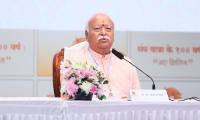Five bills will be enacted in the budget session of Parliament to strengthen the banking, pension and insurance sectors in the country.
Speaking at the 4th Pravasi Bharatiya Divas on Saturday evening, Union Finance Minister P Chidambaram said the bills to amend the Reserve Bank of India Act, Banking Regulation Act and Banking Nationalisation Act would be taken up in the ensuing budget session to strengthen the regulatory mechanism in the banking sector.
A bill to reform the pension sector and another bill to strengthen and liberalise the insurance sector would also be taken up in the budget session.
Recalling the various initiatives of the United Progressive Alliance government in the last year and a half of coming to power, Chidambaram said India would achieve a growth rate of 7 to 7.5 percent in the current fiscal year.
These measures included pursuing economic reforms more vigorously, exercising fiscal prudence, controlling fiscal deficit, increasing the tax collections even while giving tax rebates, liberalising trade and economy, augmenting investments in physical and social infrastructure, pursuing flexible foreign exchange policy and exercising tight control over inflation.
"I want to assure that our government firmly believes in these principles that form the core of economic reforms. We will make sure India remains on the high growth path," he said.
"The space for private investment has been enlarged in telecom, power, roads, ports, airports and financial sectors. A public-private partnership model has been evolved. Indian Infrastructure Finance Company has been formed to facilitate low-cost, long-term funding for infrastructure sector," he added.
Stating that the government has kept tighter control on inflation and this had been pegged at 4.4 percent in December, he said that it would be his endeavour to keep inflation low because low rates of lending and lower costs of money for investment helped economic growth. "Price stability is a paramount goal of the government and we will pursue policies that ensure low inflation," he said.
"Our exchange rate policy is a flexible policy to facilitate two-way movement of the rupee. US dollar has strengthened and the Indian rupee has also strengthened in December," he said and pointed out that the government would continue to reform the financial sector and the capital markets.
Pointing out that public and private sector banks, competing with one another made the sector efficient, he said, "Our goal is to reduce Non-Performing Assets to 1 per cent in the next two to three years.
Our BOP is healthy. We paid out $5 billion and it created hardly a ripple in the economy. Our reserves are $157 billion. India is also a top-ranking destination in foreign remittances in 2004. $21.7 billion came in the form of remittances to India. In 2005, it is estimated that $24 billion came to India as remittances," Chidambaram pointed out.
He said he believed that migration could not be stopped, but it could be managed. "It will benefit both the home country and the host country. A migrant worker, professional or businessman contributes to the development of the host country first. Only then he remits to the home country.
It is within our capacity to make India an economic power house, to achieve growth rate of 8 per cent and beyond. China believes India can do that. Tony Blair believes that India can do it. That's why he talks of India and China in the same breath. President George Bush obviously believes it and that is why he is eager to learn Hindi. I want every Indian to believe this," he said.








